Given the unending divisiveness of this thread, I’m beginning to wonder if this is another area of our lives infiltrated by Russian Twitterbots. Is nothing sacred, even audio?
(that’s a joke in case it is not obvious)
Given the unending divisiveness of this thread, I’m beginning to wonder if this is another area of our lives infiltrated by Russian Twitterbots. Is nothing sacred, even audio?
(that’s a joke in case it is not obvious)
Notice that if you rearrange “Chrislayeruk” it spells “I am in the pay of MQA”. I mean come on? What could be clearer? 
He’s in the recording/live music business, he loves his hifi, he speaks about what he hears and compares that to live performances which he is involved in. Arguably a great source of comment in this debate- live music vs reproduced music, isn’t that why we’re here?
He talks about the sound, not about the filters. He like what he hears of MQA, he’s qualified, what’s not to like.
That is almost laughable, the idea that MQA would pay me. 
Mr. @G997
I haven’t heard or seen you before, so you just rush in to this discussion and meaning that @Chrislayeruk or Chris is the “predominate propionate/defender of MQA here“?
So What Ever!
(But just between us two, so don’t say or write anything about this Okay)!!!
He is Bob S. 




almost? you don’t mean…
 no I don’t mean…
no I don’t mean… 
Ain’t that the truth

This was indeed interesting.
Funny, to me, everything in MQA sounds LESS real. Every single time!
That’s Ok, opinions differ.
True. That’s why we have so many options. Not a single one is right for everyone. We all have different ears, different brains, different systems and listening environments, and some differences, I’m sure, that I haven’t thought of. That’s why I always say “Hey, it that’s what you prefer, that’s okay with me”. But what isn’t okay with me is when some start putting down others for their preferences. We must ALL realize that in listening, there isn’t a global right, or a global wrong. It’s each individual deciding what’s right for himself/herself. And if what’s right for you is wrong for me, SO WHAT!! That doesn’t bother me on F___ing bit!
That’s groovy, but it would be utterly pointless having discussion threads on anything remotely subjective - which may be fine too.
But some of the technical stuff be discussed here is not subjective at all. Having a wrong opinion on that should be challenged.
Mr. Russell!
Funny have you worked or visiting a Real Analog Studio sometime in your life?
Regarding your answer to @Chrislayeruk
Well answered by @anon55914447
Love @ Respect
String
Whether I have worked in a real analog studio or not is totally irreverent to how my ears hear what is playing on my system, or anyone else’s system. I have heard many live performances of many types, and know what acoustic instruments should sound like. That is all one needs to be able to decide the accuracy of what sounds right to him/her or nor.
As I was replying to chrislayeruk’s comment to me about how we have differences to the sound of MQA vs Hi Rez, you comment seems, to me, rather nonsensical. I see no relevance to my comment.
@Neil_Russell
Any Sound Engineer no matter if it’s a live or studio!
Should answer anything bad about MQA’s sound referring to @jacobacci or @Rhythmatist writing and with links!
If they were working in the 70’s, 80’s and some parts of the 90’s!
This is the Studio Engineer’! Because it changed when the Computer and the Digital enters the studio!
For the Live Engineer’ so did it take a little bit longer, when the Digital came that sounded so good what they could use it, so around the 2000 something…
You see when we had the Analog Studio!
With Mixer Consoles like Neve 8076 “The Mixer Consoles Rolls Royce”


The first Digital AMS Reverb and Delay by Rupert Neve!
They still Kicking the A…Of other Digital Reverb and Delay’ Because they Sounds Analog!
All the original Neumann, AKG…Microphones some with Tubes!
With this and a lot more of equipment…
Like Westlake Studio Monitor’s!
Are all the great Recording’s and Records from the 70’s, 80’s, 90’s until the Computer’ and Digital Recording Machines made their entree’s!
I can tell you that the sound, that come out trough the speakers sounded more like MQA and Vinyl records!
It didn’t sound like CDs or Hi-Res records or SACD…
It was the Computer’s different Recording Products like Protools, Logic, Cubase…and the Digital Recording Machines first that gave you a Sound with no noise, clear and lifeless!
I have reading many different writing about MQA and that it’s have distortion!
When you have the products above that are Analog, so can you turn up the gain on a Neve Console/Mixer so event the vu meters needle is moving from, the vu meters stop! A guitar amp’s gain on maximum!
It’s calling that the more level you press into the Tape Machine, so do you get distortion! But it’s called what you get Band Compression and the more you get, so does you getting great sound!
So all vu meters was so red as possible both on the Mixer and the Tape Recording Machine!
Maybe it’s what some people mean when they say it’s distortion!
If the MQA is made from the original or any other Master, as long it’s a Tape Master so does it have distortion on every single track that is down mixed to that Master! Otherwise so didn’t the engineer/producer their job professional and bye the standard!
But it’s a huge difference between Analog Distortion and Digital Distortion! A bigger difference than between a CD player and a vhs player!!!
Because first you have green lights when yellow lights and when it comes RED LIGHTS! You shall always only have the green lights on maybe one yellow light that just flashing on and returns to green!!!
Because Digital Distortion sounds like you connect a guitar Distortion pedal between your DAC and Amplifiers and turn everything on Max it doesn’t have to be load, but it will sound crap anyway!
That’s Digital Distortion!
But anyway if you does understand what I have wrote about and try to explain how it sounded and sounds in a recording studio!
Also in a Mastering Studio!
So you can ask yourself if it’s just pure luck or what it is that makes some recording’s and Albums sounding good/great in your system and other sound like crap?
Love & Respect
String
You like great gear! Neve. API. Neumann. Studer. Westlake.
Below is a link about a visit to British Grove Studio (Mark Knopfler designed and built it.) Enjoy:
Thanks @Rhythmatist
I shall check the link.
But my point was, that I have worked with this “Great gears in the studio, under the years 1978-2000” and with this great gears, did the sound remained much closer to Vinyl and MQA! It didn’t sound like a CD, SACD…or Hi-Res!
It didn’t sound like it after being Mastered either, because the mastering studio’s also had Great Analog gear, by the same brands I mentioned in my over writing!
I have a REVOX B-77 1/4” Reel to Reel Studio Master Tape Machine, in my Music System and it’s sounds more like Vinyl and MQA ! It’s not sound anything like the other Digital Music Formats!
But MQA is the closest of the Digital Formats!
Someone in this “long discussion” wrote that Studio Monitor’s, didn’t sound so Great! But I can say that Westlake (everyone sounds Great), B&W 801 Loudspeaker from 1980 doesn’t sound crap either!
This is a photo of Abbey Road Studio 1.
Pretty good speakers and many “Audiophiles” have whose?
It’s not so much difference between High-end Speakers and Studio Speakers! But between hifi Speakers and the one who is used in Studio, it is!
Love & Respect
String
I have a theory about surface noise or tape hiss.
A white background noise may actually help us better hear below the sound floor.
Think of it as a kind of dithering of the ear quantization. Our ears are actually like an ADC in function. Hairs cause nerve impulses. Basically an A to D converter using the tympanic membrane as the microphone surface and the cilia are connected to nerves and do the A to D.
It is simple really. We can hear minute differences - for example a few cents in pitch. However the easiest way to hear or focus on minute differences is to have a reference against which to hear those differences.
Anyway I agree about MQA. There is most definitely an analog tape compression distortion effect from the apodizing filter which is pleasant. However I don’t like the way the minimum phase filter mucks up the soundstage. Recall that our horizontal plane hearing location works on two principles:
Our brain combines both principles and of course music and especially vocals has both a fundamental below 2 KHz as well as lots of sounds above (sibilance etc.). Both principles reinforce in our brain to locate sounds.
Unfortunately Minimum phase delays the higher frequencies. This doesn’t affect timbre too much but it means the soundstage location of events in the horizontal plane are not in synced time with the sounds below 2KHz. This means MQA tends to have a hole in the soundstage. Of course if your upper hearing limit ends at 10 KHz like many older men then you won’t hear this MQA distortion. I still hear up to 14.5 KHz and can hear it very clearly. Remember that principle 2 is extremely powerful above 10 KHz where attenuation by the head is severe and sound level between each ear can be enormous. So the delay of high frequencies can be extremely detrimental. In essence, despite completely opposite claims, MQA actually is a major cause of BLURRING (when it comes to soundstage)!